by Naomi L. | November 1, 2017 | Blog, Creative Writing |
Welcome to November, otherwise known to writers as National Novel Writing Month! It’s time once again to shift your writing into high gear by writing a 50,000-word novel in 30 days! Of course, it’s not so easy to take on this challenge without a fair amount of motivation to get you going, and one of my favorite sources of writing inspiration is collections of quotes by well-established writers. Over the past two years, I’ve started November by sharing NaNoWriMo motivation in the form of ten writing quotes from famous authors. Now let’s dive into another set of quotes for inspiration!
So to get you motivated for NaNoWriMo 2017, here are another ten inspirational quotes about writing from famous storytellers. Enjoy, and good luck in this year’s NaNoWriMo!

1) If you want to be a writer, you must do two things above all others: read a lot and write a lot. – Stephen King
2) Stories may well be lies, but they are good lies that say true things, and which can sometimes pay the rent. – Neil Gaiman
3) After nourishment, shelter and companionship, stories are the thing we need most in the world. – Philip Pullman
4) All you have to do is write one true sentence. Write the truest sentence that you know. – Ernest Hemingway
5) A word after a word after a word is power. – Margaret Atwood
6) There is something delicious about writing the first words of a story. You never quite know where they’ll take you. – Beatrix Potter
7) A writer is someone for whom writing is more difficult than it is for other people. ― Thomas Mann, Essays of Three Decades
8) I write to give myself strength. I write to be the characters that I am not. I write to explore all the things I’m afraid of. – Joss Whedon
9) You can make anything by writing. – C.S. Lewis
10) Write the kind of story you would like to read. People will give you all sorts of advice about writing, but if you are not writing something you like, no one else will like it either. – Meg Cabot
What are your thoughts on these writing quotes? Any others you’d add to the list for NaNoWriMo?
by Naomi L. | August 30, 2017 | Blog, Creative Writing, Featured |
So you want to be a writer. Fantastic! But have you thought it through? Do you know what it really takes to be a writer? You might think you do, but if you’re only looking through rose-colored glasses at the glamour of being a famous author, you may be shocked to find some ugly bumps in the road. Writing is full of harsh reality checks, and if you’re not prepared for what lies ahead, those cold hard truths can tear you to shreds faster than you can say “unfinished manuscript”.
So before you head out on your grand writing journey, here are six hard truths about being a writer you should really be aware of. Proceed at your own discretion!
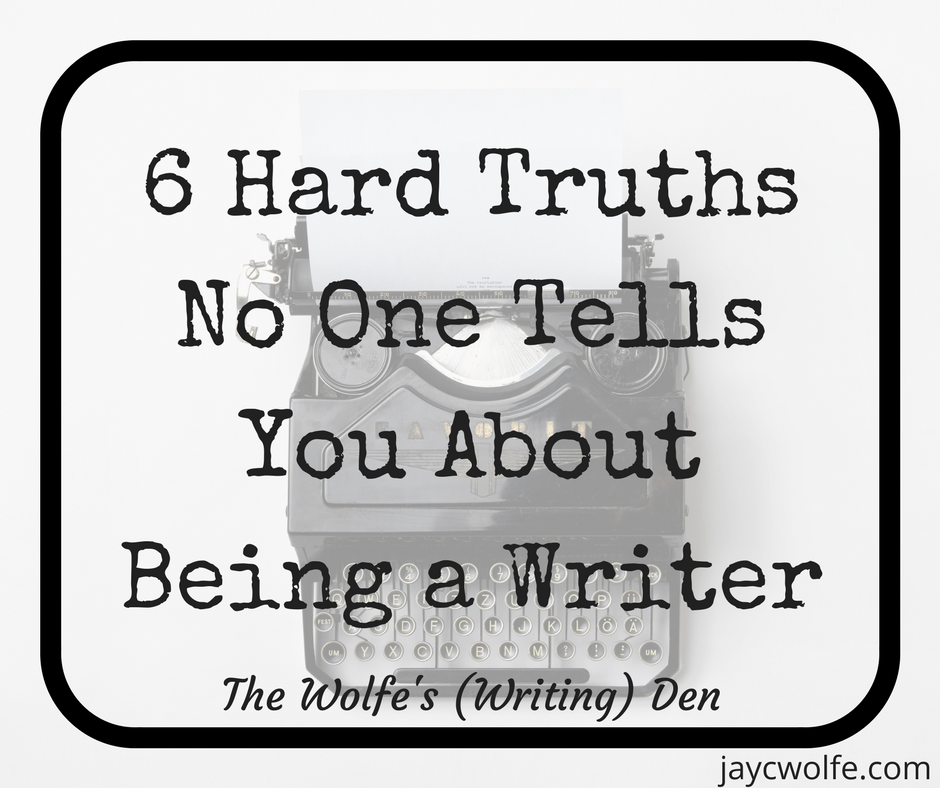
Hard Truth #1: Writing is not as easy as you think it is.
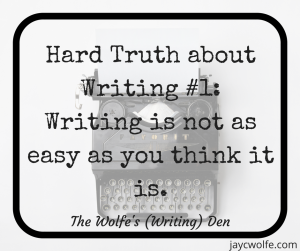 If you’re thinking about pursuing writing because it’s an easy way to make a living right off the bat, then stop right there. Turn around and go back, because this is not the calling for you. Or if you insist, proceed and find out the hard way: writing is not as easy as you think. In fact, some would go as far as to say writing is one of the hardest things in the world to do. Tons of hard work for relatively little reward? Nothing easy about that.
If you’re thinking about pursuing writing because it’s an easy way to make a living right off the bat, then stop right there. Turn around and go back, because this is not the calling for you. Or if you insist, proceed and find out the hard way: writing is not as easy as you think. In fact, some would go as far as to say writing is one of the hardest things in the world to do. Tons of hard work for relatively little reward? Nothing easy about that.
Let me be clear about something: writing itself is easy. It’s hardly a skill; I mean, we learned how to do it in preschool. What’s hard is writing well. If being good at writing were easy, everyone would be making a living from it. Or maybe no one would because everyone could do it for themselves. Either way, a world where everyone’s a writer would be vastly different than the world of “aspiring artists” we know today.
Everyone starts somewhere, and more often than not, “somewhere” is not very good. What separates the wannabes and amateurs from the serious writers is a commitment to mastering the craft. The amateurs will give up at the first sign of adversity: a lack of inspiration, difficulty editing, a polite yet stern rejection letter. The serious writers, on the other hand, will tackle those challenges and use them as motivation to improve. You can’t appreciate inspiration until you’ve faced hours of writer’s block, you can’t know how to self-edit until you’ve practiced enough times to learn what works, and you can’t find publishing success unless you keep pitching your work to people who might give you a chance.
If you go into the world of writing thinking it’ll be easy, then you’d better brace yourself for a lot of slaps in the face. The writing journey is a marathon, not a sprint. Approach it with respect, and you’ll find that while it may not get much easier over time, it will be much more rewarding in the end.
Hard Truth #2: Writing is not for everyone.
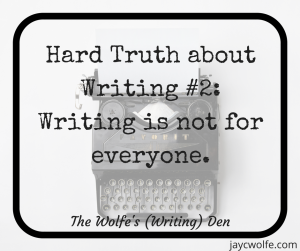 After dispelling the first myth about writing being easy, you may still want to pursue it for the sheer love of the craft. There’s nothing wrong with that; after all, a journey to becoming a writer should start with passion. But there’s more to being a writer than just writing.
After dispelling the first myth about writing being easy, you may still want to pursue it for the sheer love of the craft. There’s nothing wrong with that; after all, a journey to becoming a writer should start with passion. But there’s more to being a writer than just writing.
You might think that you don’t need to worry about editing or publishing or marketing because those jobs can all be handed off to someone else. Editing is what editors are paid for. Publishing and marketing can be handled by big publishing houses. All you have to do is write, and others will take care of the rest.
Yet in today’s world, where everyone is screaming over each other for attention, writers must be so much more. Writers must also be editors and marketers and, in the case of “indies”, even publishers. You will have to edit your own manuscript before you send it to a professional editor, and again after you get it back (expect to repeat this process several times). You will either have to convince an agent or a publisher to sell your book or make the decision to publish it yourself. You will have to do much of the marketing for your own book, regardless of which publishing route you take. And you will have to accept feedback when people actually read it, both good and bad.
So if you’re not prepared to put in all the hard work, to endure long periods of writer’s block and loneliness, edit and re-edit, power through rejections or self-publishing, and deal with criticism from readers, you might as well stop right here, because you clearly don’t have what it takes to be a writer. Well, not a published one, anyway.
This doesn’t mean you should give up writing forever; just maybe keep practicing in private until you can fully commit to becoming an author. When you’re ready to share your stories with the world, the world will be ready to read them. Until then, writing (publicly) is probably not for you.
Hard Truth #3: Inspiration doesn’t strike whenever you want it to.
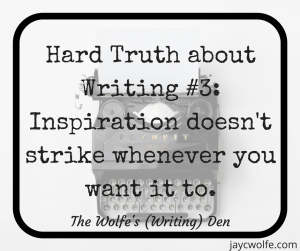 We all like to imagine artists as eccentric people in constant connection with the muses. Beauty is in everything, and even the most mundane details can be turned into a work of art in the mind of a creative person. Inspiration is anywhere and everywhere; you just have to know where to find it.
We all like to imagine artists as eccentric people in constant connection with the muses. Beauty is in everything, and even the most mundane details can be turned into a work of art in the mind of a creative person. Inspiration is anywhere and everywhere; you just have to know where to find it.
If this is your vision of writing, then prepare yourself for a world of disappointment. Much like money, inspiration doesn’t just grow on trees or fall out of the sky when you least expect it; you have to work hard to get it. The muses can be generous, but they’re also elusive. Sure, there will be plenty of times when inspiration strikes without warning, but most of the time, you will have to look for it yourself.
One of the hardest lessons you’ll learn about writing is that if you sit around waiting to write only when inspiration strikes you, you’ll never get any writing done. Many people assume that you have to get inspired to write, but believe it or not, it’s almost always the other way around: you have to write to get inspired.
Make time to create, even when you don’t feel like it. Put pen to paper or fingers to keys and start spilling words onto the page. If you don’t know where to start, use writing prompts, try writing exercises, or scribble random ideas in your notebook until something sticks. Just don’t be idle. Admit this to yourself once and for all: waiting for inspiration is nothing but a lame excuse to procrastinate. Stop waiting to be creative and just write already!
Hard Truth #4: Thick skin only comes with experience.
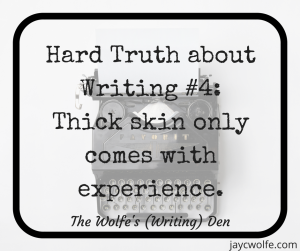 Picture this: You’ve finally published that novel you’ve been working on for years. You’ve done everything you could to make it perfect; now you sit back and wait for the praise to start rolling in. And for a while, it does: first from friends and family, then from total strangers! Everyone is liking your book! You’re a success! But just when you finally start to shed that crippling self-doubt…
Picture this: You’ve finally published that novel you’ve been working on for years. You’ve done everything you could to make it perfect; now you sit back and wait for the praise to start rolling in. And for a while, it does: first from friends and family, then from total strangers! Everyone is liking your book! You’re a success! But just when you finally start to shed that crippling self-doubt…
Gasp! What’s this? A bad review? Someone didn’t like your story! You’ve failed! All that doubt comes flooding back tenfold. And that’s why you’re now a tearstained mess, curled up on your bedroom floor and drowning yourself in chocolate for the third day in a row. Maybe you were never cut out for this writing stuff after all.
We see this advice in every publishing resource out there: if you want to be a writer, you have to have thick skin. But nobody tells you that thick skin isn’t something you magically get just because you wish for it. For most of us, the only way to learn how to brush off criticism is through brutal firsthand experience.
While it’s true that many people can dive headfirst into a profession without ever caring what people think, thick skin is especially hard for writers to develop because writing by nature requires vulnerability. As artists, we bear our souls on the page and show our emotions through our work, so when that work isn’t well received, we can’t help but take it personally. And why wouldn’t we? Our stories are our babies, and no one likes being told their baby is ugly!
No matter how much time you spend mentally preparing for bad reviews, your first one will probably hit you like a ton of bricks. Why? Because deep down, there’s a part of you that wants to believe it will never happen to you. Our fragile egos will us to believe that even though everyone has different tastes and opinions, somehow our work will be the exception that’s universally praised. And that kind of thinking is just as unrealistic as any fantasy story you’ve ever read.
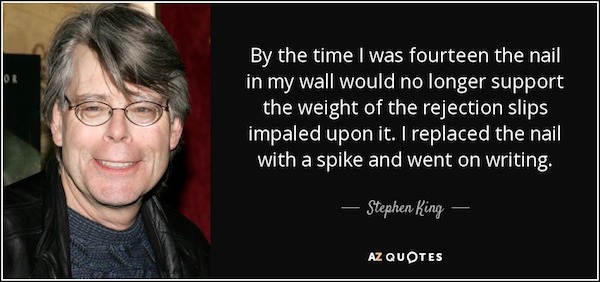
The truth is no one—and I mean literally no one—is immune to criticism. Every author gets a bad review at some point; it comes with being published. J.K. Rowling still gets one-star reviews for her critically acclaimed Harry Potter series. Stephen King, world-famous author of over two hundred stories, has too many critics to count. Margaret Atwood, Ernest Hemingway, F. Scott Fitzgerald, and Harper Lee all got scathing reviews for their classic novels when they first came out. And yet general consensus says they’re all great writers.
So don’t stress yourself out anticipating your first bad review. Instead, accept that it will come someday, tell yourself it’s okay to be upset when it does, and give yourself as much time and space as you need to move on from it. And above all, no matter how hard it seems in the moment, do not give up on writing. I promise the longer you stick with it, the easier it will get.
Hard Truth #5: Talent isn’t everything. Relationships are.
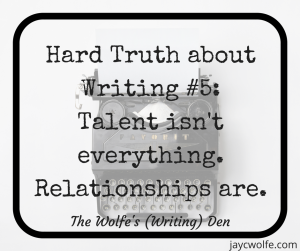 Have you ever read a well-known piece of writing—a novel, a short story, a poem—that was truly awful? Chances are you thought you could do way better. Maybe you can. Maybe you do. And maybe someday you’ll wonder why your name doesn’t appear next to those authors on the bestseller lists. Why should you have to struggle to be noticed while these writers get to enjoy fame they don’t deserve?
Have you ever read a well-known piece of writing—a novel, a short story, a poem—that was truly awful? Chances are you thought you could do way better. Maybe you can. Maybe you do. And maybe someday you’ll wonder why your name doesn’t appear next to those authors on the bestseller lists. Why should you have to struggle to be noticed while these writers get to enjoy fame they don’t deserve?
Because talent isn’t everything. That’s right, even in the world of art. Face it, even if you are extremely talented, so are thousands of other people who nobody knows or cares about. You may not be the only one reading this and thinking that your stories deserve more attention than such train wrecks as Twilight and Fifty Shades of Grey. So what makes all those terrible authors better than you? They have connections to the right people.
It takes a lot more than just being good at something to be rewarded for it. You have to know how to get your work out there, and that means building solid relationships and networks with people who can help you move forward. You need friendships with other writers who have been through the same struggles and can help you improve your writing. You need connections with editors who can polish your work and help you get it published. You need an audience of fans who will be the first to read your stories and spread the word to more potential readers.
Despite what you may think, writing is not a completely solitary endeavor. It’s more often who you know than what you know that matters. So never underestimate the power of networking, because the right person with the right connections could be the final piece of the puzzle to make your success. If you really want to be a writer, create more than stories; create meaningful, lasting relationships.
Hard Truth #6: No one chooses to write. Writing chooses you.
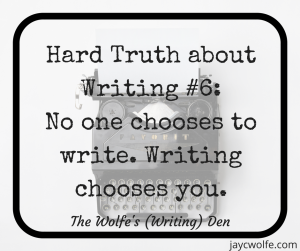 In Soviet Russia, book writes you! (You know I had to do it.)
In Soviet Russia, book writes you! (You know I had to do it.)
After learning all these hard truths about being a writer, you might be feeling a bit discouraged. Maybe you’ve changed your mind about writing and you’re already thinking about all the other skills you can put to good use instead. If that’s the case, then I’m sorry to say you were probably never meant to be a writer in the first place. But if you’ve made it to the end of this blog post and are more determined than ever to be a writer, then congratulations: writing has chosen you!
The funny thing about being a writer is that there isn’t always rhyme or reason to pursuing the craft. We write because we have to. I can’t tell you how many times I’ve looked back on old stories and blog posts I’ve written and thought, “Wow, this really sucks. Why did I write this?” And then I remember, “Oh right, because I couldn’t not write it.” This is our reality: when an idea calls, we must answer.
It’s easy enough to say you want to write your whole life, but talk is cheap. Only by doing it can you truly call yourself a writer. And if all the hard truths and fears and roadblocks of writing can’t deter you from actually sitting down and churning out those stories, then the writing life may be for you after all. So what are you waiting for? Stop reading this and get writing!
Have you learned any of these truths about writing the hard way? What other hard truths would you add to this list?
by Naomi L. | August 23, 2017 | Blog, Creative Writing |
There’s nothing quite like being in love, and for a writer who’s passionate about romance, it can be a gold mine of inspiration. I know that ever since I fell in love (most recently), I’ve found it much easier to write romantic stories and poetry, and even fiction in general. There’s plenty of creative inspiration to be found in love, so it’s only natural for artists to include so much of it in their art!
So for fun, today’s post is dedicated to a special someone who inspires much of my creative side. Here are three ways I’ve found that being in love can inspire your writing. Enjoy!
1) Being in love brings out the beauty in life.
As much as it sounds like a scene out of a cheesy romantic cartoon, being in love really does make the world around you more beautiful. And beauty is at the heart of so many of the most sincere and emotional works of art. Ever since falling in love, I’ve had a brighter outlook on life and a much deeper insight into the positive things in the world, and these have certainly manifested in my stories as romantic plots, satisfying conflict resolution, and happy endings.
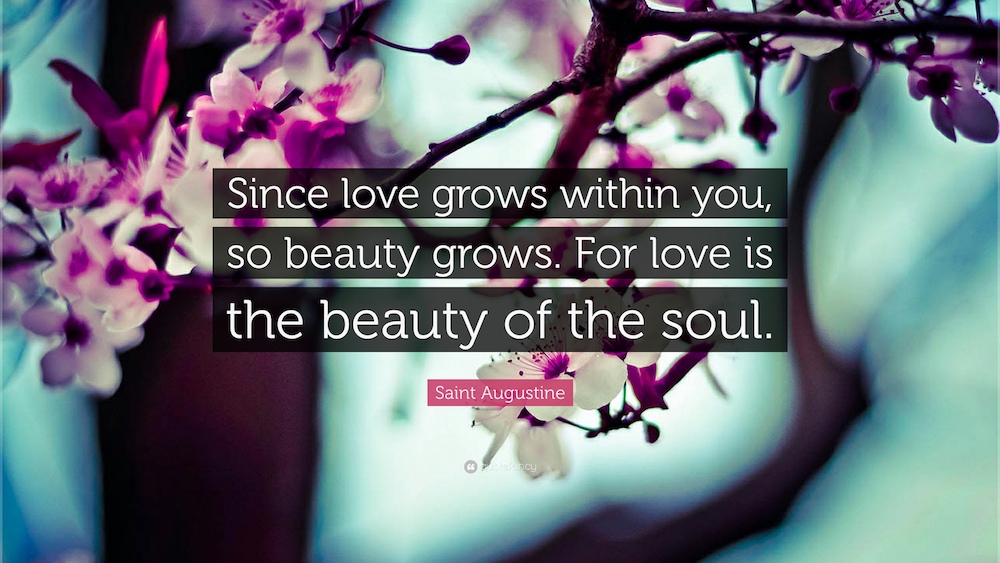
If you are or have ever been mutually in love, chances are you too have seen the world become a little brighter for it. You may know it poetically as “rose-colored glasses”, “butterflies in your stomach”, or “head over heels”, and maybe it’s even gone as far as to make you want to dance or shout with joy. Don’t limit that light to your real-world experiences; let it guide your imagination too! Write about the fluttering of the heart in a moment of passion or how much more vivid colors become through the eyes of a person in love. If writers should write what they know, then why not write about the magic in your life? It can often make for the most beautiful works of art!
2) Being in love helps relieve stress and anxiety.
 Sometimes I don’t even need to be writing romance to be inspired by love. As many writers well know, stress and anxiety can be real creativity killers depending on the kind of stories or poetry you’re trying to write. Unfortunately, the times we’re living in seem to be producing an overabundance of those bad feelings, which can translate into a severe lack of motivation for many of us. Maybe you can turn that anxiety into an aggressive streak of darker stories and poetry if that’s your style, but for writers like me, who favor romance and happy endings, it generally puts me out of the mood to create at all.
Sometimes I don’t even need to be writing romance to be inspired by love. As many writers well know, stress and anxiety can be real creativity killers depending on the kind of stories or poetry you’re trying to write. Unfortunately, the times we’re living in seem to be producing an overabundance of those bad feelings, which can translate into a severe lack of motivation for many of us. Maybe you can turn that anxiety into an aggressive streak of darker stories and poetry if that’s your style, but for writers like me, who favor romance and happy endings, it generally puts me out of the mood to create at all.
So whenever I’m feeling too stressed or anxious to write, I remind myself of how happy my significant other makes me and how good a place I’ve been in since we fell in love. Maybe it goes against the grain of the “tortured artist” stereotype, but I’m sure I do most of my best (or at least most productive) work when I feel emotionally fulfilled and free of tension. That’s not to say one should only ever use positive experiences in their fiction or poetry; after all, conflict is at the heart of every engaging story and many of the most interesting poems, and you absolutely should accept inspiration from your negative experiences too. But if you can, let real-life love motivate you to at least get those words out of your head. Not only is it one of the best treatments against stress and anxiety, it’s also a great cure for writer’s block!
3) Being in love can motivate you to be a better writer.
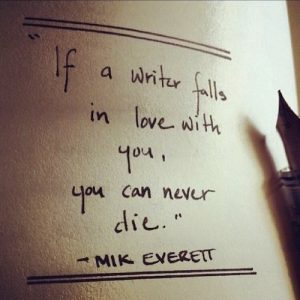 The great thing about love is that when you find it with the right person, you inspire each other to become better people. If nothing else, being in love gives me the motivation I need to be the best version of myself I can be. The amazing feeling of being loved by someone else pushes me to keep improving in the areas of my life that matter most, and few of those areas matter more to me than my passion for writing.
The great thing about love is that when you find it with the right person, you inspire each other to become better people. If nothing else, being in love gives me the motivation I need to be the best version of myself I can be. The amazing feeling of being loved by someone else pushes me to keep improving in the areas of my life that matter most, and few of those areas matter more to me than my passion for writing.
So I keep on giving it my all when I write, because if I deserve that special someone who works hard for both of us and does everything he can to support my passion, then he deserves someone who will work just as hard to help support him through her craft and keep coloring his life with all the art she creates. Relationships are all about teamwork, and if you’re really in love, you’ll want to put in the effort to make yours work. And if that includes being a better writer, then by all means let your love push you to keep reaching for those creative stars!
What about you? Have you ever been in love? How has that love inspired your writing?
by Naomi L. | November 30, 2016 | Blog, Creative Writing |
November 2016 has been an incredibly hectic month, hasn’t it? From the chaos surrounding the U.S. presidential election to the final sprints of NaNoWriMo, it certainly hasn’t been the easiest few weeks for many writers who actively follow politics. As it draws to a close, I confess I found myself more emotionally drained this month than I can recall feeling at any point during the last few years (and that’s saying something). Sounds like now would be a good time for some more inspirational words!
So just for fun, and as a little ray of sunshine for anyone else who may be needing it these days, here are ten inspirational quotes for hope and a brighter future. Enjoy!
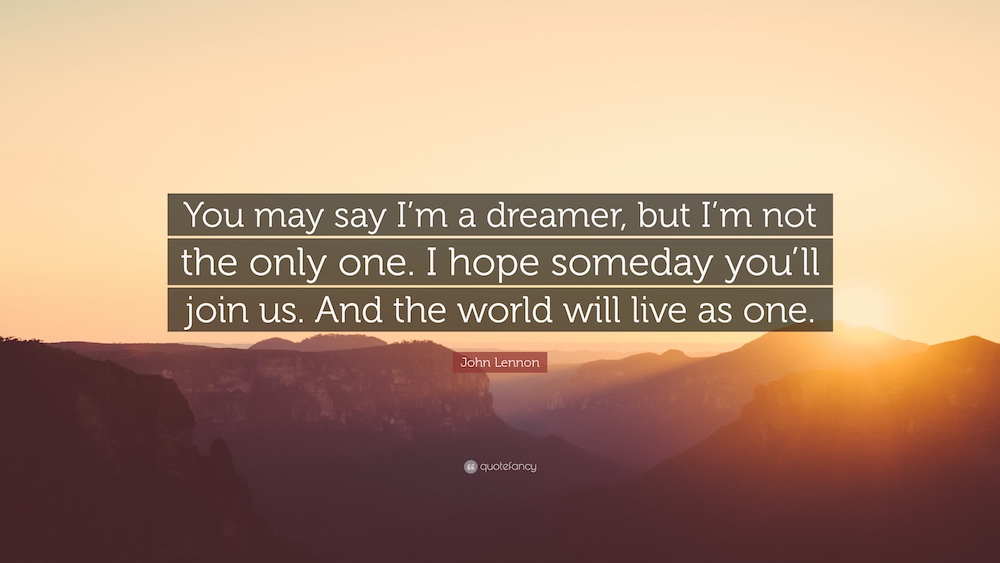 1) You may say I’m a dreamer, but I’m not the only one. I hope someday you’ll join us. And the world will live as one. – John Lennon
1) You may say I’m a dreamer, but I’m not the only one. I hope someday you’ll join us. And the world will live as one. – John Lennon
2) It’s really a wonder that I haven’t dropped all my ideals, because they seem so absurd and impossible to carry out. Yet I keep them, because in spite of everything, I still believe that people are really good at heart. – Anne Frank, The Diary of a Young Girl
3) We are only as strong as we are united, as weak as we are divided. – J.K. Rowling, Harry Potter and the Goblet of Fire
4) There is some good in this world, and it’s worth fighting for. – J.R.R. Tolkien, The Two Towers
5) Only when it is dark enough can you see the stars. – Martin Luther King Jr.
6) There is a saying in Tibetan, ‘Tragedy should be utilized as a source of strength.’ No matter what sort of difficulties, how painful experience is, if we lose our hope, that’s our real disaster. – Dalai Lama XIV
7) Remember, hope is a good thing, maybe the best of things, and no good thing ever dies. – Stephen King, The Shawshank Redemption
8) The road that is built in hope is more pleasant to the traveler than the road built in despair, even though they both lead to the same destination. – Marion Zimmer Bradley, The Fall of Atlantis
9) I am fundamentally an optimist. Whether that comes from nature or nurture, I cannot say. Part of being optimistic is keeping one’s head pointed toward the sun, one’s feet moving forward. There were many dark moments when my faith in humanity was sorely tested, but I would not and could not give myself up to despair. That way lays defeat and death. – Nelson Mandela, Long Walk to Freedom: Autobiography of Nelson Mandela
10) The best way to not feel hopeless is to get up and do something. Don’t wait for good things to happen to you. If you go out and make some good things happen, you will fill the world with hope, you will fill yourself with hope. – President Barack Obama
What are your thoughts on these quotes? Any others you would add to the list?
by Naomi L. | November 2, 2016 | Blog, Creative Writing |
Welcome to November! National Novel Writing Month is upon us again, a whole 30 days for writers to put their excuses aside, scrape together all those loose ideas, and finally write that 50,000-word novel! It’s certainly an intimidating task to say the least, but a little motivation can go a long way in helping you get started. Last year, I shared some helpful writing tips in the form of 10 inspirational quotes from famous authors, so this year I’m sharing some more quotes, this time about the creative process and what it means to be a writer.
So on that note, here are 10 more inspirational writing quotes for novel-writing motivation. Enjoy, and good luck in this year’s NaNoWriMo!
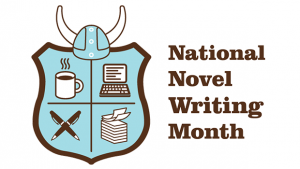
National Novel Writing Month
1) The scariest moment is always just before you start. – Stephen King, On Writing: A Memoir of the Craft
2) And by the way, everything in life is writable about if you have the outgoing guts to do it, and the imagination to improvise. The worst enemy to creativity is self-doubt. – Sylvia Plath, The Unabridged Journals of Sylvia Plath
3) Tomorrow may be hell, but today was a good writing day, and on the good writing days nothing else matters. – Neil Gaiman
4) There is no greater agony than bearing an untold story inside you. – Maya Angelou, I Know Why the Caged Bird Sings
5) You must write every single day of your life… You must lurk in libraries and climb the stacks like ladders to sniff books like perfumes and wear books like hats upon your crazy heads… may you be in love every day for the next 20,000 days. And out of that love, remake a world. – Ray Bradbury
6) Those who find ugly meanings in beautiful things are corrupt without being charming. This is a fault. Those who find beautiful meanings in beautiful things are the cultivated. For these there is hope. They are the elect to whom beautiful things mean only Beauty. There is no such thing as a moral or an immoral book. Books are well written, or badly written. That is all. – Oscar Wilde, The Picture of Dorian Gray
7) I can shake off everything as I write; my sorrows disappear, my courage is reborn. – Anne Frank
8) Lock up your libraries if you like; but there is no gate, no lock, no bolt that you can set upon the freedom of my mind. – Virginia Woolf, A Room of One’s Own
9) The first draft is just you telling yourself the story. – Terry Pratchett
10) Start writing, no matter what. The water does not flow until the faucet is turned on. – Louis L’Amour
What are your thoughts on these writing quotes? Any others you’d add to the inspirational list for NaNoWriMo?



 If you’re thinking about pursuing writing because it’s an easy way to make a living right off the bat, then stop right there. Turn around and go back, because this is not the calling for you. Or if you insist, proceed and find out the hard way: writing is not as easy as you think. In fact, some would go as far as to say writing is one of the hardest things in the world to do. Tons of hard work for relatively little reward? Nothing easy about that.
If you’re thinking about pursuing writing because it’s an easy way to make a living right off the bat, then stop right there. Turn around and go back, because this is not the calling for you. Or if you insist, proceed and find out the hard way: writing is not as easy as you think. In fact, some would go as far as to say writing is one of the hardest things in the world to do. Tons of hard work for relatively little reward? Nothing easy about that. After dispelling the first myth about writing being easy, you may still want to pursue it for the sheer love of the craft. There’s nothing wrong with that; after all, a journey to becoming a writer should start with passion. But there’s more to being a writer than just writing.
After dispelling the first myth about writing being easy, you may still want to pursue it for the sheer love of the craft. There’s nothing wrong with that; after all, a journey to becoming a writer should start with passion. But there’s more to being a writer than just writing. We all like to imagine artists as eccentric people in constant connection with the muses. Beauty is in everything, and even the most mundane details can be turned into a work of art in the mind of a creative person. Inspiration is anywhere and everywhere; you just have to know where to find it.
We all like to imagine artists as eccentric people in constant connection with the muses. Beauty is in everything, and even the most mundane details can be turned into a work of art in the mind of a creative person. Inspiration is anywhere and everywhere; you just have to know where to find it. Picture this: You’ve finally published that novel you’ve been working on for years. You’ve done everything you could to make it perfect; now you sit back and wait for the praise to start rolling in. And for a while, it does: first from friends and family, then from total strangers! Everyone is liking your book! You’re a success! But just when you finally start to shed that crippling self-doubt…
Picture this: You’ve finally published that novel you’ve been working on for years. You’ve done everything you could to make it perfect; now you sit back and wait for the praise to start rolling in. And for a while, it does: first from friends and family, then from total strangers! Everyone is liking your book! You’re a success! But just when you finally start to shed that crippling self-doubt…
 Have you ever read a well-known piece of writing—a novel, a short story, a poem—that was truly awful? Chances are you thought you could do way better. Maybe you can. Maybe you do. And maybe someday you’ll wonder why your name doesn’t appear next to those authors on the bestseller lists. Why should you have to struggle to be noticed while these writers get to enjoy fame they don’t deserve?
Have you ever read a well-known piece of writing—a novel, a short story, a poem—that was truly awful? Chances are you thought you could do way better. Maybe you can. Maybe you do. And maybe someday you’ll wonder why your name doesn’t appear next to those authors on the bestseller lists. Why should you have to struggle to be noticed while these writers get to enjoy fame they don’t deserve? In Soviet Russia, book writes you! (You know I had to do it.)
In Soviet Russia, book writes you! (You know I had to do it.)
 Sometimes I don’t even need to be writing romance to be inspired by love. As many writers well know, stress and anxiety can be real creativity killers depending on the kind of stories or poetry you’re trying to write. Unfortunately, the times we’re living in seem to be producing an overabundance of those bad feelings, which can translate into a severe lack of motivation for many of us. Maybe you can turn that anxiety into an aggressive streak of darker stories and poetry if that’s your style, but for writers like me, who favor romance and happy endings, it generally puts me out of the mood to create at all.
Sometimes I don’t even need to be writing romance to be inspired by love. As many writers well know, stress and anxiety can be real creativity killers depending on the kind of stories or poetry you’re trying to write. Unfortunately, the times we’re living in seem to be producing an overabundance of those bad feelings, which can translate into a severe lack of motivation for many of us. Maybe you can turn that anxiety into an aggressive streak of darker stories and poetry if that’s your style, but for writers like me, who favor romance and happy endings, it generally puts me out of the mood to create at all. The great thing about love is that when you find it with the right person, you inspire each other to become better people. If nothing else, being in love gives me the motivation I need to be the best version of myself I can be. The amazing feeling of being loved by someone else pushes me to keep improving in the areas of my life that matter most, and few of those areas matter more to me than my passion for writing.
The great thing about love is that when you find it with the right person, you inspire each other to become better people. If nothing else, being in love gives me the motivation I need to be the best version of myself I can be. The amazing feeling of being loved by someone else pushes me to keep improving in the areas of my life that matter most, and few of those areas matter more to me than my passion for writing. 1) You may say I’m a dreamer, but I’m not the only one. I hope someday you’ll join us. And the world will live as one. – John Lennon
1) You may say I’m a dreamer, but I’m not the only one. I hope someday you’ll join us. And the world will live as one. – John Lennon

Recent Comments